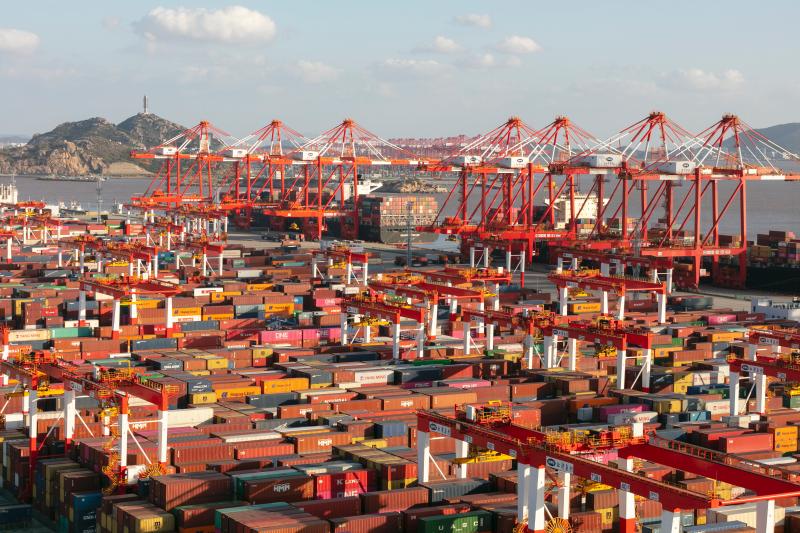China's economic growth shows why 'decoupling' is a bad idea
- By Tom Fowdy
 0 Comment(s)
0 Comment(s) Print
Print E-mail China.org.cn, January 19, 2021
E-mail China.org.cn, January 19, 2021

China's gross domestic product figures for the year 2020 were released on Monday. They revealed 2.3% growth over the past 12 months, overcoming the storm of the COVID-19 pandemic which has caused severe economic disruption worldwide and leaving as the only major economy to register growth.
Analysts attribute this to China's ability to successfully control the COVID-19 pandemic and evade the repeated shutdowns plaguing the world.
China's economy is undoubtedly now the engine room of global growth. It gives hope to markets and investors around the world, especially those looking for certainty or a safe haven. It will be instrumental throughout 2021 in guiding other countries to recover, and spearheading a global return to prosperity.
However, it comes at a time when some countries are advocating the idea of "decoupling" – that is disengaging from the Chinese economy. In the last few days of his administration, President Donald Trump has slapped an ever-growing number of measures on Chinese companies and targeted its exports.
These moves are a bad idea, to the detriment of the United States as a whole. The world economy is indeed a global entity, and, therefore, prosperity is contingent upon interdependence and mutual openness.
As the latest U.S. data shows in regard to Trump's trade war against China, this has cost over 245,000 jobs, and cutting ties with Beijing will not make America richer or able to grow faster. Thus, as China now positions itself for further growth in 2021, the new Biden administration should aim to rethink the legacy of Trump's self-defeating and counterproductive policies.
The Trump administration advocated a misleading train of thought that the prosperity of China was at the expense of the United States. This was used to push a series of arguments that "decoupling" in the trade, financial and technological spheres, would make America wealthier and bring jobs home, as well as quash China's own rise.
This, of course, was a completely false precept. The global economy is not a zero-sum game. The economic fortunes of countries are interconnected, especially when things such as supply chains and consumer markets span multiple countries. When one major economy gets hurt, others get hurt, too; however when one major economy drives growth, others experience the ripple effects.
The year 2021 is set to see a rebound in the global economy. The proliferation of vaccines and the unravelling of lockdown and travel restrictions will see life return to relative normality and businesses will recover the ground lost last year.
However, the cornerstone of all this is China. It boasts the world's largest consumer market and the world's largest industrial base, all of which have proved resilient over the past year. For investors and consumers around the world, Beijing is a safe bet, expected to achieve around 7-8% GDP growth in the coming 12 months, which will subsequently have a ripple effect across other countries who are seeking to escape massive slumps.
For example, the recovery of China means inbound imports from neighboring countries such as Japan and South Korea will boom. Thus, recovery comes in a cyclical, global form.
Given this, the logic of decoupling that Trump has pushed does not stifle China as much as it damages American interests. It has been assumed by advisors of the administration that a push for decoupling could divide the world into two economic blocs and alienate China, but given the size and scope of its economic reach across the world this is just impossible and, not surprisingly the idea has found little favor elsewhere, illustrated by the two major economic agreements involving China, the EU-China investment treaty, and the Regional Comprehensive Economic Partnership, signed last year.
If anything, such moves only serve to alienate America and shift the balance of economic power away from it. The United States needs to engage in the global economy if it is to stay relevant, not disengage.
Therefore, China's economic data should remind the incoming Biden administration that America has nothing to gain from its current path, and it ought to moderate its approach towards Beijing in the view of facilitating the country's own recovery.
Trump's spree of last-minute attacks against China do not seem to represent any kind of strategic logic as much as they appear to be a bitter, last minute lashing out in the pursuit of a confrontational Cold War vision.
China will irrespectively continue to drive global economic growth forward and it must be understood that openness, and not confrontation, is what can drive a global recovery and return to normality.
Tom Fowdy is a British political and international relations analyst and a graduate of Durham and Oxford universities. He writes on topics pertaining to China, the DPRK, Britain and the U.S. For more information please visit:
http://www.formacion-profesional-a-distancia.com/opinion/TomFowdy.htm
Opinion articles reflect the views of their authors, not necessarily those of China.org.cn.
If you would like to contribute, please contact us at opinion@china.org.cn.





